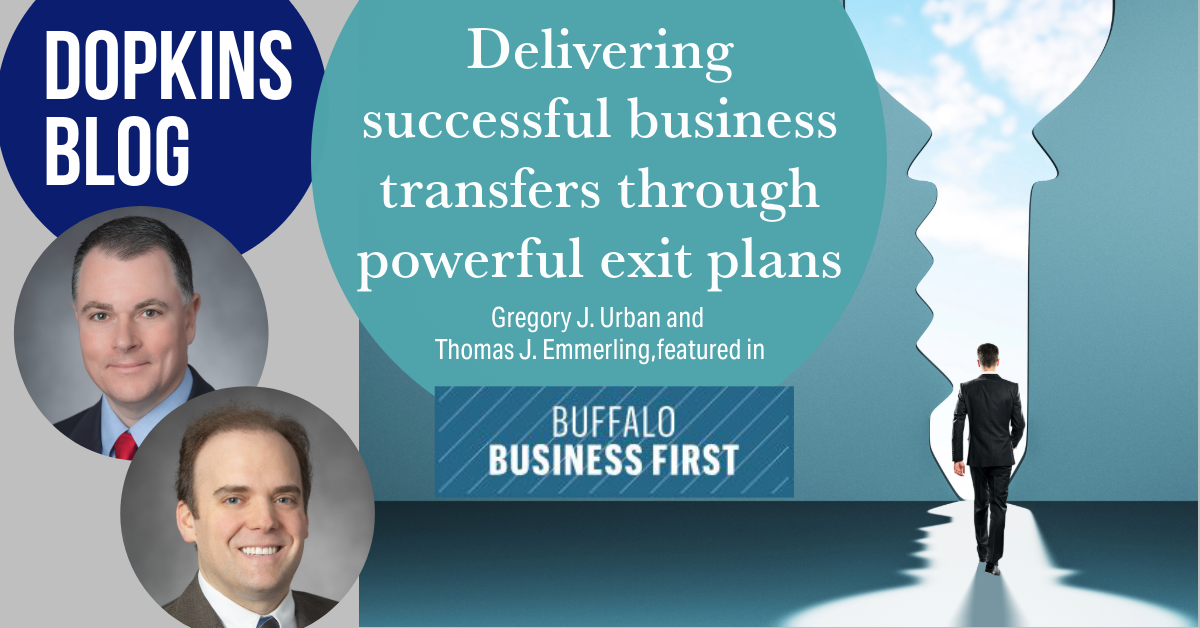Featured in Business First: Delivering successful business transfers through powerful exit plans
June 9, 2024 | Authored by Thomas J. Emmerling PhD, CFA®, CVA®
June 7, 2024 – Gregory J. Urban CPA, CVA and Thomas J. Emmerling, PhD, CFA®, CVA® recently authored a guest column in Business First of Buffalo.
Delivering successful business transfers through powerful exit plans

All businesses will change hands at some point, in some way. The definition of a successful business transfer depends upon aligning owner preferences with market opportunities. What may look like the optimal transfer for one owner may be the exact outcome another owner wants to avoid. Moreover, human preferences are not static and evolve with circumstances and life experiences. When the business is the owner’s largest financial asset, the stakes are high and a successful outcome is critical.
The power of a written exit plan
Having a written, living and breathing exit plan can help maximize the chances of a successful transfer. As a navigational tool, a written and evolving exit plan has many benefits to an owner, including (1) memorializing their current life situation, (2) educating on exit options and (3) identifying an exit which best aligns with their goals.
Powerful plans address the myriad of issues and considerations which inevitably arise in any business transfer. Below are some considerations for business owners to broach within their written exit plan.
Financial and mental readiness
Several studies by the International Exit Planning Association find that approximately 85% of business owners are not mentally ready to exit their businesses. For these owners, choosing to work or staying to grow their businesses for personal and financial fulfilment represents their optimal strategy. Many advisors to business owners solely focus on financial readiness. While it is crucial to know whether the wealth tied up in the business is needed to satisfy a lifestyle, it is equally important to know how closely one personally identifies with their business.
Value range of the business
The value of a business is tied directly to the type of exit the business owner chooses. Even though internal transfers often lead to lower values than in the open market, they allow for greater levels of flexibility and control. For some owners, this level of control is an entirely acceptable trade-off for a lower value. For others, an external sale to a strategic buyer is the only acceptable option. Importantly, the value of the business is a range concept.
Tax and financial planning considerations
A comprehensive exit plan addresses the fundamental question; “If I or my team were no longer available to operate my business, what would it take to continue to succeed?” The importance of the answer to this question is highlighted by a few realities. First, the value of the business may constitute a substantial portion of an owner’s personal wealth and income. A sudden death or disability of the owner, or a key member of management, can lead to a sudden loss in value and income generating ability.
Secondly, if an unfortunate circumstance were to occur, it is not uncommon for individuals to be put in a position of having to operate a business without the appropriate amount of experience and expertise. Individuals thrust into these circumstances can bring about a loss of customers and key employees, leading to a decline in value and income generating capacity. Fortunately, there exists the opportunity to alleviate these outcomes and pave a path forward with a well-crafted exit or succession plan. This fundamental planning includes buy-sell agreements, a key employee retention strategy and consideration of the impact of taxes.
A well-crafted buy-sell agreement sets the terms under which an owner’s interest in a business should be sold is a fundamental element of a succession plan. The plan can also detail to whom the interest should be sold and at what price the sale is to occur.
Key employees are fundamental to a successful business and it is often necessary to retain key employees to ensure continued success. Identifying alternatives to reward and incentivize these employees is another critical element of a comprehensive plan.
As it relates to taxes, business owners should note that beginning on Jan. 1, 2026, the current lifetime estate and gift tax exemption will be cut in half. Families that face this reality may benefit from proactive planning now. Business owners may consider transferring ownership interests in the business to a future generation to remove appreciation from the owner’s estate and implement a multi-generational planning program that can help alleviate unfortunate outcomes.
Getting it right
A powerful written plan addressing the above considerations (and more) provides a critical edge when so much is at stake and getting it right is paramount.
For more information, contact Gregory J. Urban CPA, CVA at gurban@dopkins.com or Thomas J. Emmerling, PhD, CFA®, CVA® at tjemmerling@dopkins.com.
To read the article on the Business First of Buffalo website, click here.
Dopkins Capital Advisors provides clients with comprehensive services covering mergers and acquisitions, business valuations, and business exit planning and execution. Our team of financial professionals, with focused expertise in accounting, tax advisory, investment banking, and wealth management, create a leverageable ecosystem to provide a full suite of capital advisory services.
Dopkins & Company, LLP also offers comprehensive accounting, auditing and tax services, forensic accounting, outsourced accounting, as well as wealth management consulting, internal audit support and capital advisory services to privately held and public companies, not-for-profit organizations and individuals.

About the Author
Gregory J. Urban CPA, CVA
Greg’s main focus is on providing tax consulting, compliance and valuation services to privately held businesses and their owners. He has extensive experience advising clients on complex tax compliance issues, including tax credit optimization, mergers and acquisitions.

About the Author
Thomas J. Emmerling PhD, CFA®, CVA®
Tom counsels clients in exit planning and mergers and acquisitions, helping them navigate the complex and often lengthy process as businesses are transitioned to new ownership.

